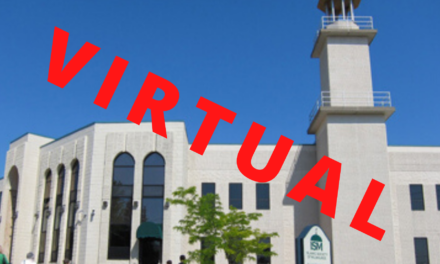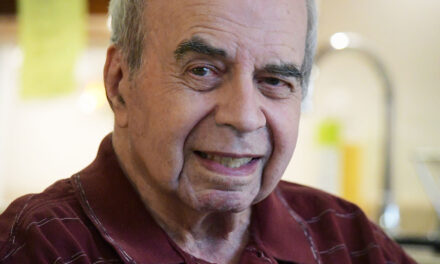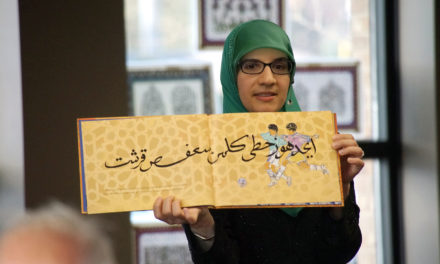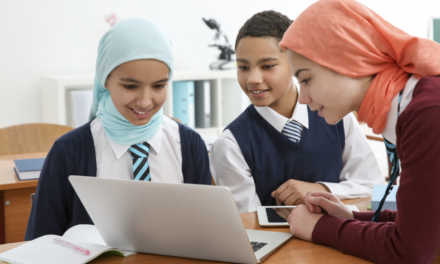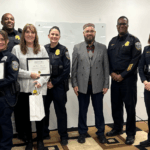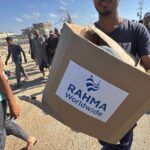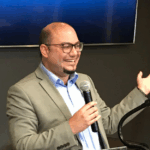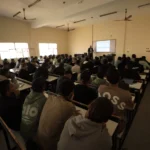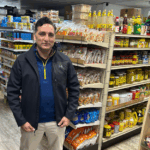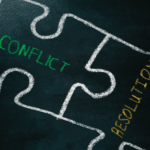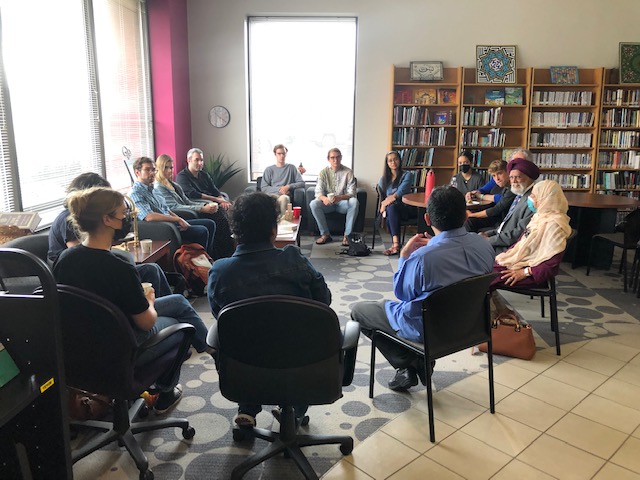
Volunteers who speak Hindi, Urdu, Turkish and Indonesian met this month with university students from around the United States who are preparing to study overseas this fall.
Volunteers from Milwaukee’s Muslim community spent an afternoon at the Islamic Resource Center in mid-July with a unique group of language students, giving them a chance to converse with native speakers of some less commonly studied languages and learn about their cultures.
Milwaukee Muslim Women’s Coalition organized the July 15 event at the Islamic Resource Center, 5235 S. 27th St., Greenfield, that brought together volunteers who speak Hindi, Urdu, Indonesian and Turkish with Boren Scholars (undergraduates) and Fellows (graduate students) who are studying those languages this summer at the University of Wisconsin-Madison. Volunteers introduced the students to customs, food and conversation of countries where they will study abroad this fall.
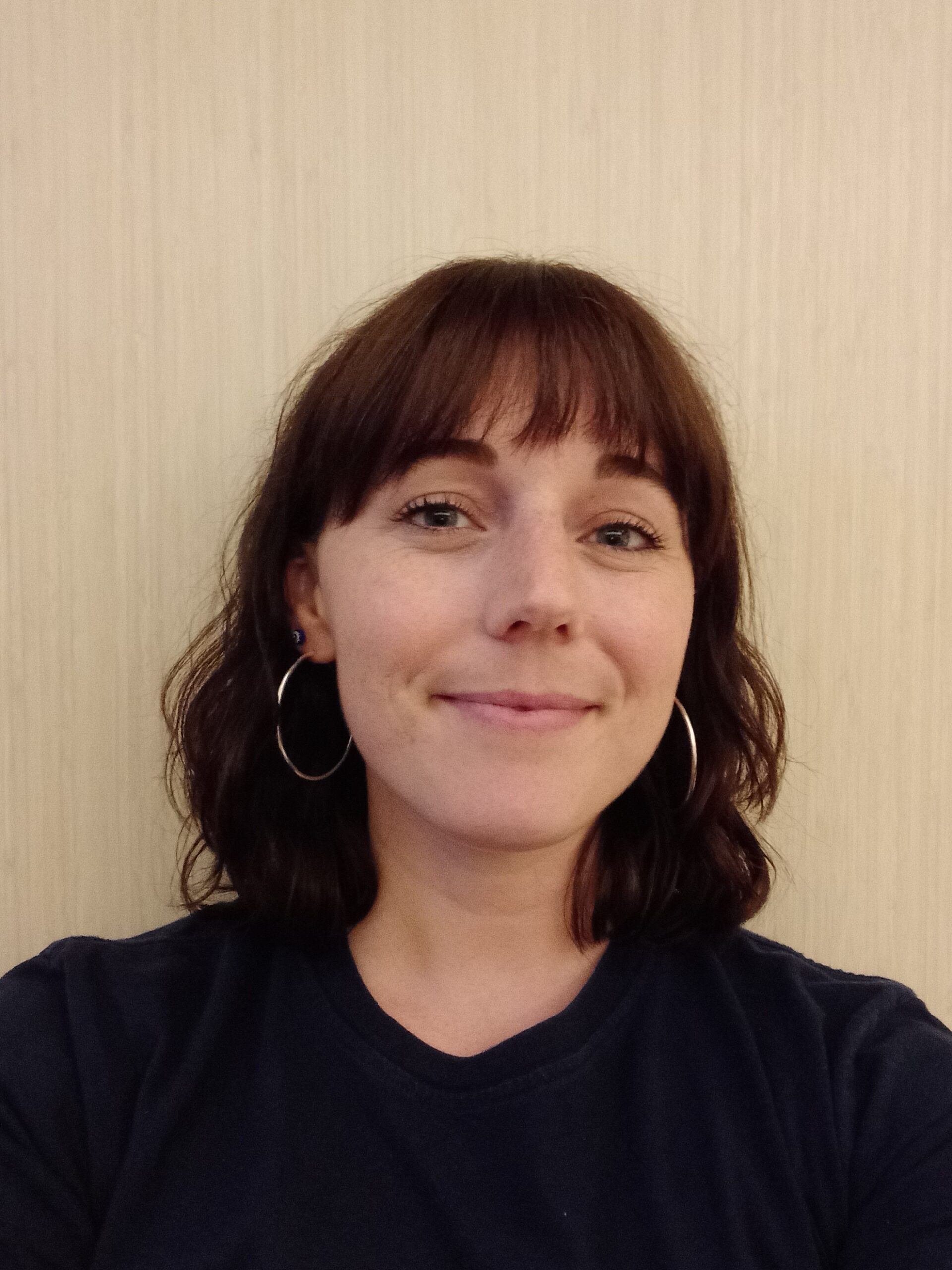
Kylie Holland, program coordinator for the Regional Flagship Language Initiatives, University of Wisconsin-Madison.
“The students really enjoyed being able to meet and learn from somebody from that actual culture,” said Kylie Holland, program coordinator for the Boren Regional Flagship Language Initiatives at the University of Wisconsin-Madison. “We want our students to be exposed to various cultural aspects they will experience abroad, but we also want them to know that people from these cultures are here in their own communities and all over the world. The Milwaukee Muslim Women’s Coalition’s event is a great learning opportunity for them.”
UW-Madison’s Wisconsin Intensive Summer Language Institutes provides language instruction for three of the four Boren Regional Flagship Language Initiatives, the Indonesian, South Asian and Turkish programs. (The fourth, the African Languages Flagship Initiative, is hosted by the University of Florida.) Selected students from universities all over the country participate in these RFLIs through funding from Boren Awards, which sponsors intensive language study for U.S. citizens going into public service.
MMWC’s local immersion experience for UW-Madison’s RFLI students returned after a two-year hiatus during the pandemic. It began as an annual event in 2015, serving the South Asian language group (Hindi and Urdu). This year it also included students of Turkish and Indonesian.
An afternoon at the Islamic Resource Center
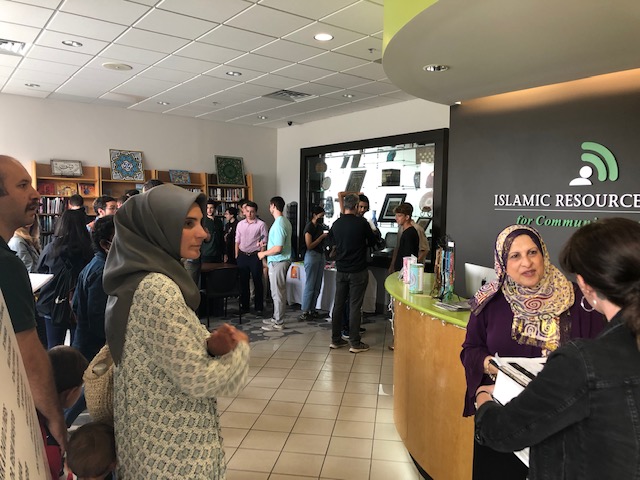
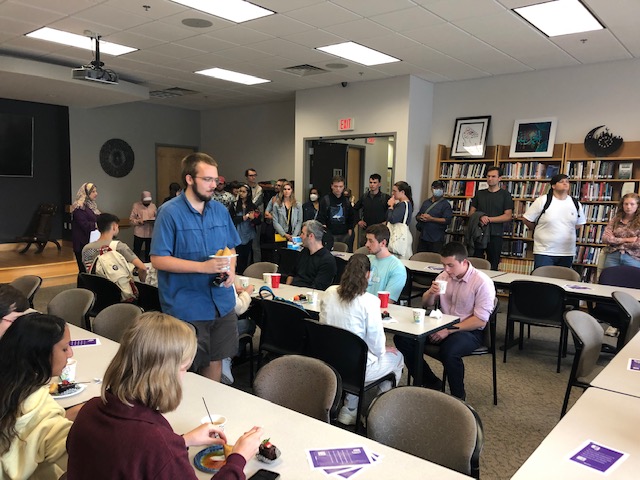
Milwaukee Muslim Women’s Coalition organized an afternoon of cultural and language immersion for university students in the Regional Flagship Language Initiative at UW-Madison.
All 36 of the 2022 Boren Award students at UW-Madison participated in the visit to the IRC: 13 Indonesian learners, 13 Turkish learners, eight Hindi learners and two Urdu learners, Holland said.
MMWC president and IRC director Janan Najeeb began the program with an introduction to the MMWC, a description of its mission, goals and projects, and an overview of Milwaukee’s Muslim community, Holland said. The students were introduced to the volunteers from each language group and were invited to ask questions that were addressed in a large group discussion.
Then students and volunteers sat in individual language groups. Students had the opportunity to speak the languages they are studying with native speakers. The volunteers also provided guidance on local customs and manners of their native countries. “Some of the students may not have had any prior exposure to Muslims and Islamic practices. Others may be Muslims themselves. For all of them, it was an opportunity to gain perspectives from people from the target culture and to speak in the target languages,” Holland said. “It was really fun for them.”
Rafat Arain, founder and director of Wisconsin’s first Islamic childcare center, Crescent Learning Center, served as a volunteer who speaks Urdu. She told the Wisconsin Muslim Journal the students at the event “were very interested in speaking the language because they are going to India soon.” She gave them some hints about speaking Urdu, she said.
She also provided practical tips. “You will find the culture very hospitable,” she told them. “Everyone will offer you food and drink. Even street vendors will offer you a sample. Take it but don’t eat it,” she advised. “You can always give it to someone who is hungry, but be careful about what you eat and carry your own water. And, if you go shopping, take a local with you to do the bargaining,” she added.
When MMWC calls for volunteers, “I help whenever I can,” Arain said. “Programs like this help people understand each other.”
Marquette University Associate Professor of Theology Irfan Omar, Ph.D., noted, “What they could gain (from this event) is an understanding about Muslims and Muslim-run institutions, women leadership roles, and perhaps they could learn a bit about Islam. They should certainly become aware of the diversity of Muslims in the United States and in Milwaukee.” Omar volunteered to speak with students studying Hindi or Urdu.
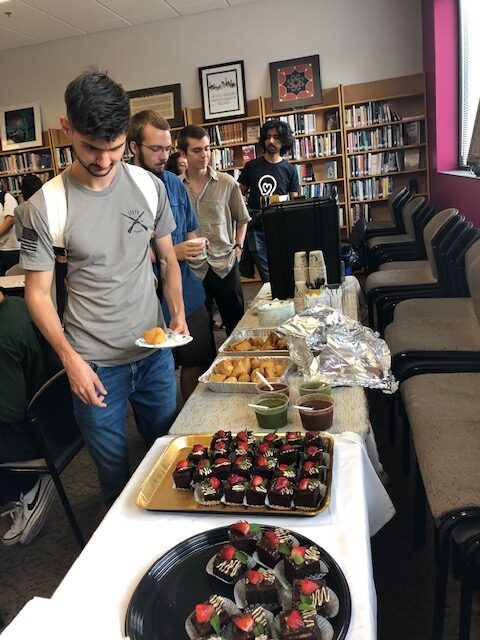
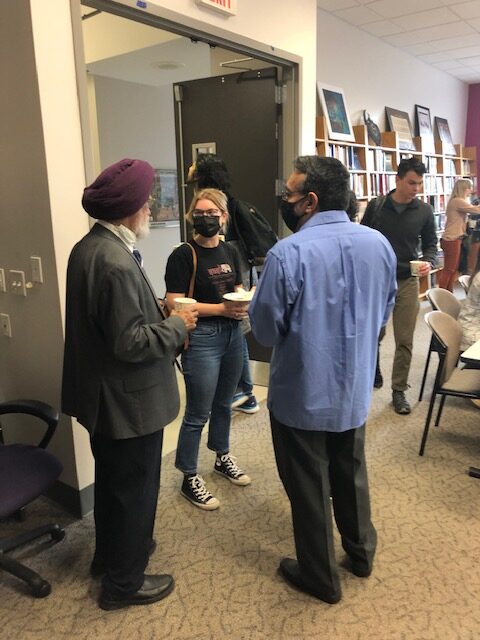
Language students and volunteers enjoyed chai and samosas, a fried pastry with a spicy, savory filling, and dessert.
Fatih Harpci, Ph.D., associate professor of religion and Religion Department chair at Carthage College in Kenosha, was a Turkish-speaking volunteer. “By welcoming language students and giving them some exposure to language and culture, the Islamic Resource Center showed how essential building bridges is between people of various cultures and ethnic backgrounds in today’s world,” he said. “At the center, the students learned to be attentive to their host countries’ sensitives regarding family life, cuisine and so on. Programs like this help language students approach diversity with understanding, respect and appreciation that will be crucial for their responsible participation in becoming global citizens.”
Holland said opportunities to learn about other languages and cultures are valuable because “language is a unifier. When you get to know somebody’s language, you start to have a different way of thinking. It’s so important for people, no matter your age, no matter where you are from, to step outside of yourself and have a different point of view. Language really helps with that.
“Language and culture are so intimately intertwined,” she continued. In addition to the trip to the IRC, “we have our Culture Initiative which is an online resource that anybody can access. It is free and open-sourced.” The Culture Initiative includes an app with cultural scenarios that aim to push students to think about their own cultural viewpoints, she explained.
“They learn about their target cultures but also about how our culture shapes our own world view. The scenarios help them evaluate how they would react in certain situations and gives them tools of intercultural competency, which is the goal of the Culture Initiative.”
The students read these scenarios and have round table discussions about them and about their own culture. “We want them to be as prepared as possible before they go abroad,” Holland said.
Who are the Boren Award recipients?
Boren Scholarships (for undergraduates) and Fellowships (for graduate students) fund language and overseas study programs for students committed to public service, “working in positions critical to U.S. national security throughout the federal government, including the Departments of State, Defense and Homeland Security, and USAID,” according to the Boren Awards website. Award recipients are required to complete a year of public service but preference is given to those who intend to make longer-term commitments.
The Boren Awards uses a broad definition of national security that goes beyond traditional concepts of national defense, diplomacy and intelligence matters to include a myriad of challenges facing global society, including economic development, environmental sustainability, food security, public health and disease prevention, and many more.
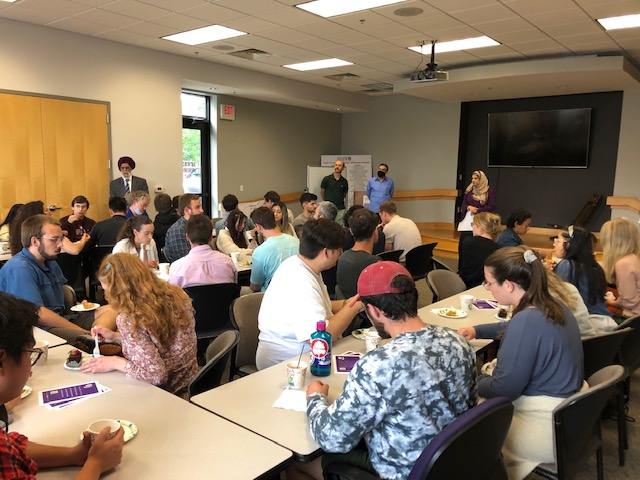
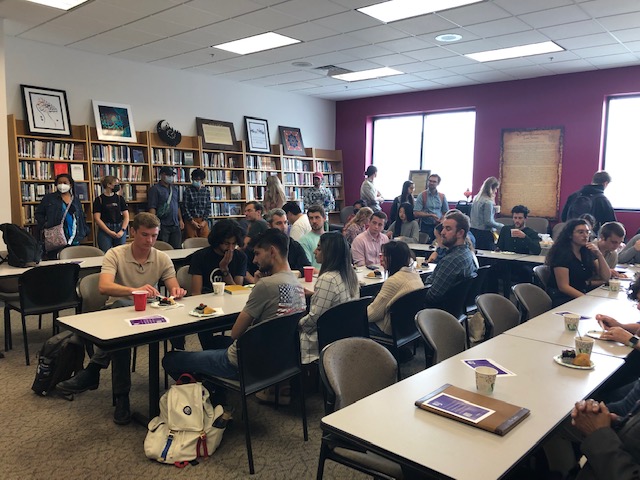
“Students come from a wide range of majors,” Holland said. “A lot of them are interested in international relations, but we also have people in psychology, computer science, law and the STEM fields. It’s really cool to see so many diverse people coming into the program.”
The Boren awards “place a strong emphasis on public policy issues related to U.S. national security and select applicants interested in pursuing careers with the federal government,” a video Introduction to the Boren Awards states. Recipients of the awards are required to commit to one year of public service after graduation.
The Regional Flagship Language Initiatives, which are funded through Boren Awards, are part of the National Security Education Program, a federal initiative designed “to build a broader and more qualified pool of U.S. citizens with foreign language and international skills.” Established in 1991 by the David L. Boren National Security Education Act, its primary mission is to develop a pipeline of foreign language and cultural expertise for the U.S. federal government workforce.
The Boren Awards focus on less commonly taught languages and fund overseas studies in destinations less common for American students but deemed to be of national security interest to the U.S. After their eight-week intensive language program at UW-Madison, the students will continue their studies in India, Indonesia or Azerbaijan during the fall semester.
“Along with the language study, we also try to give them cultural information before going abroad,” Holland said. “We want to give them as much preparation as we can before they go abroad where they will be fully immersed in the language and culture.”
Towards becoming global citizens
Holland, who served in the Peace Corps in Indonesia, experienced a similar pre-service training with intensive language learning and cultural immersion. The big difference was that the training took place in Indonesia.
“It’s nice to have had an experience of my own,” she said. “I can reassure students and also impart how important it is to not just be a tourist in a place but to immerse yourself into the culture and try to integrate as much as possible. To do that, you have to learn to be flexible and meet the unfamiliar with fascination.”
Holland describes the feeling of culture shock one has in a new place as a kind of opening up, “noticing what is strange or different and at the same time recognizing your own native culture isn’t the way things are done everywhere, nor does it have to be. It’s not a negative thing; it’s really eye-opening!”
